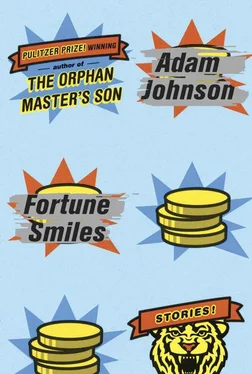When the first package appeared a month ago, I assumed it was a mistake, that it had been left at the wrong address. It sat unopened as I waited for its rightful owner to claim it. But when the next package appeared, I knew it was no error. I opened the first one right away. Inside were the keys I’d worn on my hip for sixteen years. It was the prison’s master set. How had they left my possession? Who had sent them to me and why? I clipped them to my belt, where they belonged.
The next package deepened the mystery. Inside was an ashtray. It was heavy and made of lens-quality glass. It was a souvenir Gitte brought me from a state-sponsored photography conference she attended in Dresden. When light struck the ashtray, it glowed eerily, making the inmates nervous as they sat before my desk. One day, after it had sat on my desk for ten years, it vanished. We tore the prison apart, scouring every inch, the prisoners not resting for weeks. Broken, the ashtray could become a terrible weapon — heavy and sharp, it could gash the necks of a dozen guards. We searched the latrines, the rain gutters, the ashes in the furnace. We dumped cauldrons of mess-hall stew. Inmates hand-sifted thirty thousand shovels of snow. Frozen corpses in the morgue were stripped, and the plaster casts were broken off everyone in the prison infirmary. The ashtray was never seen again — until it appeared, hand-wrapped, on my lawn. I could almost smell the f6 cigarettes I used to smoke.
The latest package I unwrap slowly. The twine is tied tight, the paper crisply folded. The clear tape that secures the corners is tinged a bureaucratic yellow. Inside I discover a silver bracelet that I bought for Gitte on our twentieth wedding anniversary. Because of what happened to her parents, because we’ll never know how long they might have stayed married, Gitte and I always said we’d be married fifty years. So I had the bracelet inscribed:
“Hans & Brigitte ~ Only Thirty More to Go.”
It was too heavy for her wrist, she said. She wore it only to official functions.
I don’t know why, but holding the bracelet, I start to weep.
Prinz leaps onto the table to lick my tears.
—
Later that night, Prinz and I curl on the couch — from here I’ll be able to see the flash of the Polaroid if our mysterious package leaver returns. A wind shuttles up the chimney’s hollow throat. There is a dry crackle in the leaves outside. A flat white light enters through laced curtains, casting a web over the dog peeking from behind my knees. It is in this patterned light that I regard the Polaroid of my wife. Her body is no longer youthful, but she is beautiful. The photographer, I believe, agrees. He has captured the elegance of how her hair falls, the way her breasts roll sweetly to the side. She is prepared for him. Her legs are slightly parted, her eyes curious and wry. It hurts to know that as soon as he pushes the button that captures this image, she will beckon him. It hurts to know that he will not have to heave wide the deadweight of her thighs. She will do that for him. Still, he would know nothing of her secret embers.
It’s late when my daughter calls. We’re not due to speak until mid-December, when we make our Weihnachten plans.
“Papa,” she says. “There is a video of you on the Internet.”
“This is not possible,” I tell her. “I give no interviews. Please tell me — how is your mother? Does she speak of me?”
“The video is crazy,” she says. “You are insulting a famous writer. You are waving a bag of dog shit around.”
“Is she there?” I ask. “Is she in the house with you?”
“Papa, you must listen to me. There is a film of your dog shitting on the memorial of Klaus Wexler, and you’re talking to the dog and acting like the dog can talk to you. Papa, this man won the Georg-Büchner Literaturpreis. You call him a deviant and an addict. You admit he was stripped and frozen and made to weep for his lost parents in your prison.”
“I have done nothing wrong,” I say to her. “I have hurt no one. Will you tell your mother that for me? That I never did anything to hurt her, that I followed all the rules, that I was the one who looked the other way when bad things happened in our marriage.”
—
The next morning, I walk Prinz on the far side of the street, and I catch myself looking in people’s windows. I wonder whether their lawn decorations are sincere or props. The packages have me in a suspicious frame of mind. Even though the Stasi no longer gang-stalk their subjects, my gaze lingers on everyone. A man bends to tie his shoe. A woman in jogging clothes brushes her stomach. I see a gentleman my age, and I study him — will he touch his ear or, worse, clasp his hands behind his back? I can’t help but look for meaning in parked cars, in their colors and models. There was a day when you could spot the cars of those who were watching you. You knew what it meant when a blue Moskvitch curbed its wheels or a pair of white Trabants was working both sides of the street.
We stop across from 66 Genslerstrasse, where the prison’s main gates are located. A parade of kids files out of a bus, and you can tell they’re Wessis. The kids from the West have a sense of ownership, like East Berlin is a new toy they’re trying out. The Ossis, on the other hand, are wary and unsure, like they’re trespassing in their own neighborhood. They smoke twice as much and cut their eyes at everything.
And into this tableau appears the curator, walkie-talkie in hand as he connects the school group with a guide, a woman in her sixties. He practically bounces across the street when he spots me. “Guten tag, Herr Warden,” he says.
“I’m just Hans now,” I tell him.
He looks at my face. “You’ve seen the video?”
“I’m aware of it,” I say.
“You mustn’t be upset. The girl who recorded it, she is young. Just look at the other videos she posted. A boy falling off a bicycle, a toenail-painting party, a cat attacking a bowl of fruit.”
I nod.
“Please, Hans, join me for a coffee — my treat. I have something to discuss.”
We cross the street together, but at the prison gates I stop.
“Is it the dog?” the curator asks. “I assure you he is welcome. Many returnees bring psychological dogs to help with the ordeal.”
“What ordeal?”
The curator frowns. “Of returning.”
“Prinz is not a psychological dog.”
“Of course,” he says.
I stand at the threshold. He looks at me expectantly. “When were you last on the premises?” he asks.
“October third, 1990,” I say.
“Nineteen ninety? Yet you live a block away,” he says. He looks at my belt. “You still carry the keys to the prison. Come, Hans, I assure you that everyone is welcome here. The memorial is open to all people who wish to remember.”
He touches my shoulder and directs me into the yard. I pull Prinz close.
The yard is filled with jostling teenagers and Dutch tourists. Where the Stasi officers’ social club was once located, there is a bookstore. The south wall’s tiger cages have been turned into a café. We head there and, after ordering cappuccinos, sit in modern chairs behind large panels of aqua-tinted glass. The café walls are adorned with framed photographs, some of which once hung in my office, including one of me greeting Stasi head Erich Mielke during his inspection of the facility.
“There was a photograph in my office of me and my wife,” I tell the curator. “If it is possible, I would like it returned. When the prison closed, I thought there would be an extra day to retrieve my personal effects, but that was not so.”
“I know the image,” the curator says. “The archivists have actually just restored your office. They are amazing. You should see how they painstakingly document each cell. They record every letter scratched into the walls, they lift each fingerprint trapped in the coats of paint, all in an effort to determine the prisoners who were remanded here and when. As you know, all the records were destroyed.”
Читать дальше












